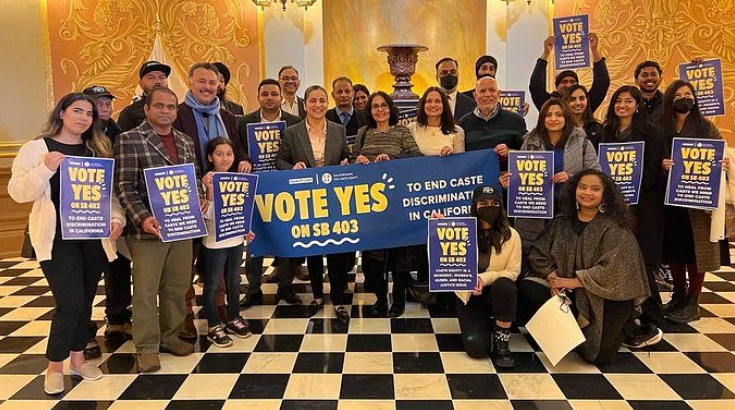US needs SB 403 because Indians carry caste to America and Dalit discrimination at IITs, IIMs is proof.
An excerpt from SB 403: SEC. 7: Section 12920 of the Government Code is amended to read: It is hereby declared as the public policy of this state that it is necessary to protect and safeguard the right and opportunity of all persons to seek, obtain, and hold employment without discrimination or abridgment on account of race, caste, religious creed, color, national origin, ancestry, physical disability, mental disability, medical condition, genetic information, marital status, sex, gender, gender identity, gender expression, age, sexual orientation, reproductive health decision making, or military and veteran status.
It is the purpose of this part to provide effective remedies that will eliminate these discriminatory practices.
Cries of “Hinduphobia” have reached a feverish pitch after Senator Aisha Wahab, a first-term California State Senator of Afghan origin, introduced SB 403 on 22 March. She has been viciously trolled, has received violent threats, and her office virtually invaded by belligerent constituents who oppose the bill.
What is it about a straight-forward amendment to a law prohibiting caste discrimination in employment, housing, and education in California that is so threatening to many in the Hindu American community?
Hindu self-victimisation
When I mentioned the controversy over the bill to a non-Indian friend, her first reaction was, “Wow, are they saying that explicitly calling out racism in our civil rights laws makes all white people suspects?”
We all know that the answer is no; and that it’s only those who exhibit racist behavior who should be afraid of civil rights laws. So also, only those who act out their caste biases in the workplace or in schools and colleges should be afraid of SB 403. The bill makes no mention of Hinduism or India, as caste is prevalent in several religious communities in South Asia.
But such considerations are not stopping Hindu nationalist groups from spreading unfounded fears that the bill is directed against all Hindus and will make them immediate targets — an argument that elides over the important detail that many beneficiaries of the law would indeed be Dalit Hindus. They also fail to acknowledge that Hindus are least likely to encounter religious hatred as #34 among 35 communities tracked by the FBI.
At any other time, such paranoia would have been dismissed out of hand by lawmakers. But, unfortunately, with their money power and legislative clout, groups such as the Hindu American Foundation have been able to propagate the belief that there is wide-spread Hinduphobia in America. Many people are falling for that narrative and are reacting to SB 403 as another expression of Hindu hate.
The Georgia Resolution against “Hinduphobia”
While “Hinduphobia” is not widespread, there have certainly been notable recent cases in some parts of the country, which we must acknowledge and condemn. The “No Dot” signs appearing in the Atlanta suburbs in the fall of 2021 is a troubling example, which rudely reminded the Hindu community of the “dot busters” campaign in New Jersey several decades back.
So, it is entirely understandable that the Georgia House of Representatives were sympathetic to their Hindu constituents and passed a non-binding resolution last week condemning “Hinduphobia” and anti-Hindu bigotry. It was clearly driven by events local to Georgia.
However, the narrative accompanying the resolution defines Hinduphobia as a “set of antagonistic, destructive, and derogatory attitudes and behaviours towards Sanatana Dharma (Hinduism) and Hindus that may manifest as prejudice, fear, or hatred.”
That is an overly broad definition under which any and all criticism of Hindu nationalism and caste could also be defined as “Hinduphobia.” That seems to be the position of Coalition of Hindus of North America (CoHNA), who rely on a flawed Rutgers University report to make their claim of widespread “Hinduphobia.” That is deeply troubling for those who do not consider caste discrimination and anti-Hindu bigotry in the diaspora as a zero sum game and would like to end both.
California as a bellwether state
California enacted civil rights laws in 1959 to prohibit discrimination in employment and housing based on a person’s race, religion, national origin and ancestry…In the decades since…They expanded the original act’s list of protected classes to include as many as 18 characteristics such as sex and disability…
One of the arguments being advanced by opponents of SB 403 is that existing laws already cover caste discrimination, so why do we need a new law?
Senator Wahab responds in her TIME interview: “…California’s civil rights law does cover caste to some degree, because some people will put it under the concept of ancestry or race. But caste is very specific; it encompasses more than just those two factors. We are just trying to clarify the law to explicitly include protection against discrimination based on a person’s caste…”
California is NOT proposing a new law against caste discrimination, but is merely proposing to add “caste” as the 19th category of potential discrimination under its existing civil rights laws.
Critics of SB 403 argue that there is no evidence of widespread caste discrimination in America. This is simply not true, as there are several surveys and testimonials from Dalits and others about caste biases that they encounter every day at work and in social settings. In my view, any form of discrimination must be seen from the vantagepoint of the victims, not from the perspective of the privileged, who may be oblivious to their own harmful behaviors.
In any case, critics also fail to understand that the intent of the law is not to just react to actual discrimination on the ground, but to serve as a deterrent and to provide remedial courses of action for the victims.
The CISCO caste discrimination case
At this point, it is worth recalling the lawsuit filed by the California Civil Rights Department against Cisco. According to one report, “Cisco employee relations manager Brenda Davies’s investigation notes on the case showed evidence of caste-based discrimination, and yet she closed the case on the grounds that caste discrimination was not unlawful.”
What that clearly implies is that had there been a law in place explicitly listing “caste” as a category of discrimination, Cisco may have reacted differently to the employee’s complaint of caste discrimination. That alone is sufficient to justify the need for SB 403.
Mark Chandler, former Chief Legal and Compliance Officer at Cisco, seems to agree: “We also don’t believe we should be subject to claims either in court or in an arbitration for a form of alleged discrimination that is not legally recognized. We would however fully support the Legislature adding caste to the list of categories having protection against discrimination.”
In the meantime, the good news is that Cisco has added prohibition against caste discrimination in its employee Code of Business Conduct.
The Hindu nationalist conundrum
The Hindu American Foundation continues to toe the caste-is-not-part-of-Hinduism line, despite the fact that many prominent Hindu religious thinkers, including the Kanchi Shankaracharya have defended the caste system as an integral part of the Hindu tradition.
Why is that relevant to SB 403?
It shows the circular argument used by critics of SB 403: Maligning it as an attack on all Hindus, while at the same time arguing that caste has nothing to do with Hinduism.
This contradiction is not going to be very helpful in their advocacy against the bill.
India as an early role model
Some opponents of SB 403 preface their argument with the fact that India banned caste discrimination in 1950, with the adoption of its Constitution.
True, India has put in place some of the most progressive laws since, aimed at achieving Ambedkar’s ideal of liberty, equality, and fraternity. Sadly, seventy three years later, India is far from attaining that goal. Day to day atrocities and rampant discrimination against Dalits continue in educational and social settings.
Institutions such as the IITs and IIMs, who prepare students of mostly dominant and privileged castes to succeed in the world, have failed to prepare them for “equality and fraternity” with their Dalit and Bahujan brothers and sisters.
Under these circumstances, it is unrealistic to expect new immigrants from India not to bring their prejudices to America. The Cisco case as well as other caste discrimination surveys clearly show that caste prejudices are becoming more and more prevalent as the demographic mix of Indian Americans is changing, with more Dalits and Bahujans joining the diasporic community.
CB 403 is a logical and timely response to this change and will serve as an important mechanism to prevent caste prejudices from infecting the workplace and educational settings.
Raju Rajagopal is co-founder of the Hindus for Human Rights (@Hindus4HR). Views are personal.
(Edited by Anurag Chaubey)
Source: theprint.in





